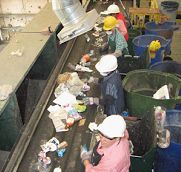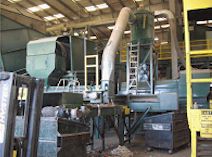|

Employees sorting material
at Victor Valley MRF,
located in Victorville, CA. |
The Mojave Desert and Mountain
Recycling Authority is a California Joint Powers Authority (JPA), consisting of
nine communities in the state's San Bernardino County high desert and mountain
region. The JPA financed and manages the operations contract for the highly
automated Victor Valley Material Recovery Facility (MRF). The MRF today receives
and processes an average of 130 tons per day, five days per week, of single
stream paper and containers and recyclable-rich commercial
waste loads. The JPA has two strategies regarding
process residue:
-
Reducing residue rates from
existing deliveries to optimize MRF operations;
-
Increasing recovery for
recycling by expanding the recyclable-rich and organics-dense waste load
deliveries to the MRF and/or a composting facility.
In August 2008, the JPA
contracted with GBB to prepare the Victor Valley Resource Management Strategy
(Resource Management Strategy). Working with RRT Design and Construction, Inc.,
GBB prepared a coordinated forward-looking strategy to guide the JPA's future
program and facilities decisions. The Resource Management Strategy focused on
the Town of Apple Valley and the City of Victorville, the two largest JPA member
communities with respective populations of 70,000 and 107,000, which have a
combined total of more than 130,000 tons per year of material entering the JPA's
recycling system and the Victorville Landfill.
The Resource Management
Strategy is underpinned by a visual characterization of nearly 300 waste loads
delivered to the Victorville Landfill in the fall of 2008. The waste
characterization indicated that as much as 80% of loads of residential and
commercial waste landfilled could be processed for recycling and composting in a
combination of manual and automated sorting facility. Loads sufficiently dry and
containing primarily non-bulky materials were judged eligible for processing and
recovery.
|

Victor Valley MRF. |
The Resource Management
Strategy provided a conceptual design and cost that identified projected capital
and operations costs that would be incurred to construct a new pre-processing
system to separate out materials for recycling and composting from eligible
loads. Based on the waste composition analysis, residue from a proposed system
was estimated. This residue would be rich in combustible materials, sufficient
to send to an energy recovery market.
Furthermore, the Resource
Management Strategy sets the stage for JPA programs to address the December 2008
California Scoping Plan's mandates and priorities. The Scoping Plan, a roadmap
for statewide greenhouse gas emission reduction efforts, specifically calls out
mandatory commercial recycling, expanded organics composting, and inclusion of
anaerobic digestion as renewable energy. The Resource Management Strategy
assessed three cement manufacturers, located in the high desert region, for
their potential to replace a portion of their coal fuel with residue from the
MRF and potentially from other waste quantities generated in the region. Cement
kilns are large consumers of fossil fuels, operate on a continuous basis, and
collectively are California's largest source of greenhouse gas emissions.
Further processing requirements were also identified for size reduction and
screening to remove non-combustible materials and produce a feasible refuse
derived fuel (RDF). A conceptual design system to process residue and supply RDF
to a cement kiln was developed, as were estimated capital and operating costs to
implement the RDF production system.
The Resource Management
Strategy, by including separate collection of yard waste, food waste, and soiled
paper, as well as the alternative to collect these materials in waste loads and
recover them in a pre-processing system, successfully addressed the California
Public Resources Code requirement that "all feasible source reduction,
recycling, and composting measures" are implemented prior to approving any new
"transformation" facility. This planning effort also provided a basis for
greenhouse gas reduction analysis consistent with statewide initiatives to
reduce landfill disposal.
As of Spring 2009, the JPA is
implementing improvements to its MRF recommended by the Strategy, for reducing
MRF residue. Also, the JPA is monitoring two food waste composting pilot
projects being conducted at two regional facilities, while promoting the use of
the commercial scale composting facility to commercial landscapers and other
generators of commercial yard waste.
JPA Administrator John Davis
made a presentation on this important project at the North American
Waste-to-Energy Conference held May 18-20, 2009 in Chantilly, VA. John Roderique,
GBB Vice President, will present the project at the SWANA Landfill Symposium and
Planning & Management Conference to be held June 1-4, 2009, in Savannah, GA.
Related
Web Links:
>>
Press
Release
>>Mojave
Desert and Mountain Recycling Authority's Website
>> Back to top |